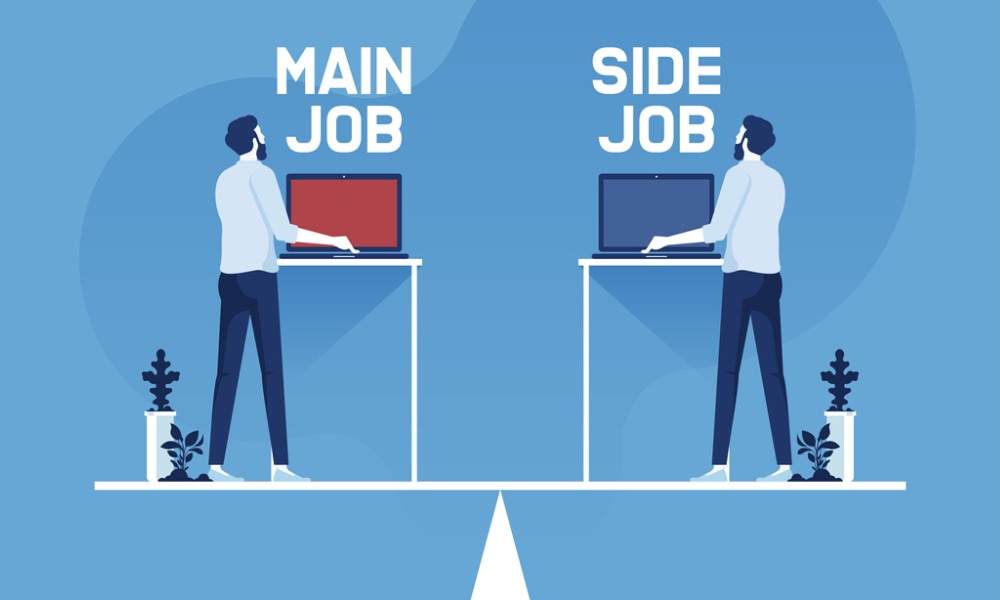
79% of employees have worked at least two jobs at the same time

With inflation remaining high and the cost of living crisis wreaking havoc on many savings accounts, more and more employees are taking second jobs to bring in much-needed money.
According to research from ResumeBuilder, 79% of employees have worked at least two jobs at the same time. What’s more, 36% of the respondents said they have at least two full-time jobs, with the majority making six figures from both roles.
And while it may be a necessity for financially stressed employees, for HR it brings up a whole host of questions around legalities, productivity and trust. More specifically, as an employer, can you ever legally terminate an employee for secretly moonlighting?
Speaking to HRD, employment lawyer Mike MacLellan says that it’s not a good idea to start firing indeterminately.
“In most cases no, an employee is free to have a second, or even third, job,” he says. “This is common in the case of part-time workers who will take on additional jobs to supplement their income.
“Working at another job is considered off-duty conduct, which really is none of the employer’s concern. There may be an exception comes where work at the second job can negatively impact the employer’s business.”
For example, a sales representative for one business may not be permitted to act also as a purchaser for a second business – especially where doing so would put them in a position to buy and sell their own products.
“Generally speaking, employment or other business arrangements which put the employee in a conflict of interest position violate the employee’s common law duty of fidelity and good faith with their employer,” MacLellan tells HRD.
“Likewise, if an employee’s work for another company leaves them too preoccupied or too ‘worn out’ to fulfil the duties of their position, they risk being performance managed or even terminated on a just cause basis for failing to uphold their end of the employment contract – to competently provide work to the employer.”
While it’s not likely an employee can be rightfully terminated for having a second job, in some cases it can lead to a firing.
Take, for example, the case of a B.C teaching assistant who was terminated from her role after it emerged she had a second job with an OnlyFans account. And while this was more for “off duty conduct” issues, it does beg the question of whether or not an employee has a legal obligation to disclose a secondary job?
“An employee doesn’t have to disclose having a second job, unless required by the terms of their employment contract such as where they might be in a conflict position without the authorization of their employer,” clarifies MacLellan.
“If an employer is seeking special accommodation, such as adjusted hours of work, they will need to provide a truthful and reasonable explanation for the request. If that means disclosing that they want to have time to attend their second job, then so be it.”
But can you legally force an employee to disclose their secondary job in the first place? Or is that a violation of an individual’s privacy?
“If an employee is working a second job that creates a conflict situation or prevents the employee from performing their duties for their employer, then certainly they could be faced with the ultimatum of resigning their second job or being terminated from employment,” adds MacLellan.
If you suspect an employee could have a secret second job, it’s best not to jump to assumptions. Instead, take a look at the facts and determine on a case by case basis how to proceed. If the employee is still performing their duties to a high standard, does it even matter they have a second role? Or, on the other hand, is their productivity waning?
“The employer should first of all honestly assess whether the moonlighting has any negative impact on the employment relationship,” says MacLellan. “Is the employer still getting performance of work that is required under the employment contract? If so, the employee’s second job is none of the employer’s concern.”
Ultimately, if the employee is not performing their duties adequately, then the employer should address this with the employee.
“This would be the case no matter the reason for poor performance,” adds MacLellan. “If the employee discloses that they have a second job, then the employer needs to assess whether and to what extent they can tolerate the interference with employment. Is there an apparent solution to the interference? Consider the circumstances and respond reasonably.”
At the end of the day, whether or not you agree with one of your employees having a secondary job is a personal opinion. If the worker in questions isn’t technically breaking any contractual rules, and their productivity is maintaining, then firing them could lead to legal issues for your organization in the long run.
“The employee’s duty of fidelity to the employer is an implied term of every employment relationship,” adds MacLellan. “It’s not necessary for an express term to be included in a written employment agreement prohibiting the employee from taking additional employment that would interfere or conflict with employment.
“However, for employees with significantly senior roles or responsibilities, spelling out their duty to devote working time to the employer, and to avoid conflicts of interest, can be a prudent consideration.”
Want to learn more about employment law updates and changes? Attend our Employment Law Masterclass here.